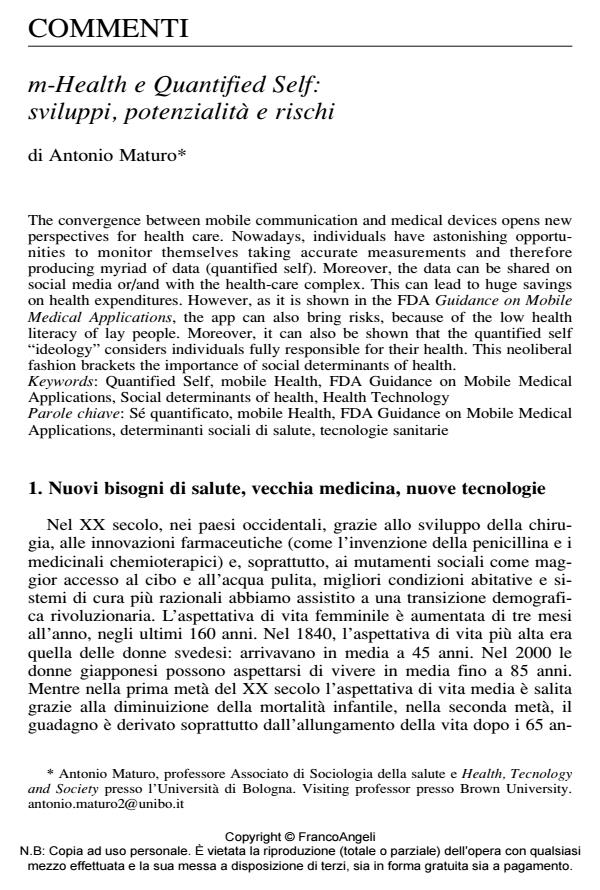M-Health e Quantified Self: sviluppi, potenzialità e rischi
Titolo Rivista SALUTE E SOCIETÀ
Autori/Curatori Antonio Maturo
Anno di pubblicazione 2014 Fascicolo 2014/3 Lingua Italiano
Numero pagine 10 P. 161-170 Dimensione file 509 KB
DOI 10.3280/SES2014-003012
Il DOI è il codice a barre della proprietà intellettuale: per saperne di più
clicca qui
Qui sotto puoi vedere in anteprima la prima pagina di questo articolo.
Se questo articolo ti interessa, lo puoi acquistare (e scaricare in formato pdf) seguendo le facili indicazioni per acquistare il download credit. Acquista Download Credits per scaricare questo Articolo in formato PDF

FrancoAngeli è membro della Publishers International Linking Association, Inc (PILA)associazione indipendente e non profit per facilitare (attraverso i servizi tecnologici implementati da CrossRef.org) l’accesso degli studiosi ai contenuti digitali nelle pubblicazioni professionali e scientifiche
The convergence between mobile communication and medical devices opens new perspectives for health care. Nowadays, individuals have astonishing opportunities to monitor themselves taking accurate measurements and therefore producing myriad of data (quantified self). Moreover, the data can be shared on social media or/and with the health-care complex. This can lead to huge savings on health expenditures. However, as it is shown in the FDA Guidance on Mobile Medical Applications, the app can also bring risks, because of the low health literacy of lay people. Moreover, it can also be shown that the quantified self "ideology" considers individuals fully responsible for their health. This neoliberal fashion brackets the importance of social determinants of health.;
Keywords:Sé quantificato, mobile Health, FDA Guidance on Mobile Medical Applications, determinanti sociali di salute, tecnologie sanitarie
- Brown G. (2009). Una vita senza fine. Invecchiamento, morte, immortalità. Milano: Raffaello Cortina
- Cipolla C. (2002). La malattia fra interpretazioni biologiche e sociali. In: CERFE, a cura di, Per un’interdipendenza attiva tra Nord e Sud del pianeta. Salute e Società, 3(I)
- Cipolla C. (2009). Darwin e Dunant. Dalla vittoria del più debole alla sopravvivenza del più forte? Milano: FrancoAngeli
- Cipolla C. (2013). Perché non possiamo non essere eclettici. Il sapere sociale nella web society. Milano: FrancoAngeli
- Clarke A., Shim J. (2011). Medicalization and Biomedicalization Revisited: Technoscience and Transformations of Health, Illness, and Biomedicine. In: Pescosolido B.A. et al., a cura di, Handbook of the Sociology of Health, Illness, and Healing. New York: Springer
- Durkheim E. (2008). Le regole del metodo sociologico. Torino: Einaudi [ed. orig. 1895] European Commission (2014). Green Paper on Mobile Health
- Foucault M. (1969). La nascita della clinica. Einaudi, Torino [ed. orig. (1963). Naissance de la clinique. Une archeologie du regard médicale. Paris: Presses Universitaires]
- Giarelli G. (2003). Il malessere della medicina. Milano: FrancoAngeli
- Gottfredson L. (2004). Intelligence. Is it the Epidemiologists’ Elusive ‘Fundamental
- Cause’ of Social Class Inequalities in Health? Journal of Social and Personality Psychology, 86: 174-199
- Gustafson A. et al. (2014). Smartphone Application to Support Recovery From Alcoholism. A Randomized Clinical Trial. Jama Psychiatry, published on line March 26, 2014
- Horwitz A., Wakefield J. (2009). La medicalizzazione della tristezza. In: Maturo A., Conrad P., a cura di, La medicalizzazione della vita, Salute e Società, a.VIII, n. 2 (numero bilingue italiano/inglese): 56-74
- Kickbush I., Maag D. (2007). Lo sviluppo della Health Literacy nelle moderne società della salute. In: Ingrosso M., a cura di, Fra reti e relazioni: percorsi nella comunicazione della salute, Salute e Società, a. VI, n. 1
- Lane C. (2007). Shyness. How a Normal Behavior Became a Sickness. New Haven & London: Yale U.P.
- Light D. (2010). The Food and Drug Administration: Inadequate Protection from Seriou Risks. In: Light D., a cura di, The Risks of Prescriptions Drugs. New York: Columbia U.P.
- Link B., Phelan J. (2010). Social Conditions as Fundamental Causes of Health Inequalities. In: Bird C., Conrad P., Freemont A., Timmermans S., Handbook of Medical Sociology. Nashville: Vanderbilt U.P.
- Maturo A. (2007). Sociologia della malattia. Milano: FrancoAngeli
- Maturo A. (2009). The Shifting Borders of Medicalization: Perspective and Dilemmas of Human Enhancement. Salute e Società, a. VIII, n. 2: 13-31
- Maturo A. (2012a). Social Justice and Human Enhancement in Today’s Bionic
- Society. Salute e Società, a. XI, n. 2: 15-28
- Maturo A. (2012b). Medicalization: Current Concept and Future Directions in a
- Bionic Society. Mens Sana Monogr, 10: 122-133
- Maturo A. (2012c). La società bionica. Saremo sempre più belli, felici e artificiali?
- Milano: FrancoAngeli
- Maturo A. (2014). Italy: Health Care Delivery System, Encyclopedia of Health, Illness, Behavior and Society. London: Wiley Blackwell
- Morozov E. (2013). To Save Everything, Click Here: Technology, Solutionism, and the Urge To Fix Problems That Don’t Exist. London: Penguin
- Oeppel J., Vauppel J.W. (2002). Broken Limites to Life Expactancy. Science, 296: 1029-1031
- Parsons T. (1965). Il sistema sociale. Comunità, Milano [ed. orig. (1951), The Social System. Glencoe: The Free Press]
- Rose N. (2008). La politica della vita, Einaudi, Torino [ed. orig. 2007, The politics of Life Itself. Biomedicine, Power, and Subjectivity in the Twenty-First Century. New Haven: Princeton U.P.]
- Shim J., Russ A.J, Kaufman S.R. (2006). Risk, life extension and the pursuit of medical possibility. Sociology of health and illness, 28(4): 479-502
- Shim J.K. (2010). Cultural Health Capital: A Theoretical Approach to Understanding Health Care Interactions and the Dynamics of Unequal Treatment. Journal of Health and Social Behavior, 51: 1-15
- e-Health and social innovation Carmine Clemente, in SALUTE E SOCIETÀ 1/2015 pp.101
DOI: 10.3280/SES2015-001008EN - e-Health e social innovation Carmine Clemente, in SALUTE E SOCIETÀ 1/2015 pp.102
DOI: 10.3280/SES2015-001008 - Activity Theory as a Theoretical Framework for Health Self-Quantification: A Systematic Review of Empirical Studies Manal Almalki, Kathleen Gray, Fernando Martin-Sanchez, in Journal of Medical Internet Research /2016 pp.e131
DOI: 10.2196/jmir.5000 - Handbook of Research on Advanced Research Methodologies for a Digital Society Eugenio Bagnini, Giovanna Russo, pp.404 (ISBN:9781799884736)
Antonio Maturo, M-Health e Quantified Self: sviluppi, potenzialità e rischi in "SALUTE E SOCIETÀ" 3/2014, pp 161-170, DOI: 10.3280/SES2014-003012